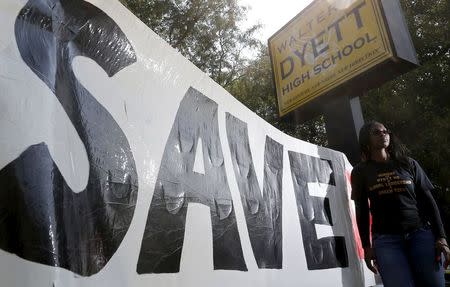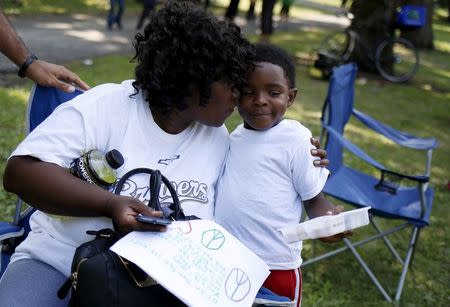Chicago school closure battle intensifies with hunger strike
By Fiona Ortiz
CHICAGO (Reuters) - A long-standing battle between activists and the City of Chicago over school closures in minority neighborhoods has intensified with a dozen protesters entering their twelfth day of a hunger strike on Friday over a shuttered high school.
Camped out on the lawn in front of Dyett High School in South Chicago, the strikers vow to consume only liquids - such as juice and chicken broth - until the city agrees to reopen the school.
The protest comes as the Chicago Public Schools, the third-largest school system in the country, cuts 1,400 jobs, seeks a $480 million bailout from the state of Illinois and struggles to beef up underfunded pensions.
"This is part of a global fight against the privatization of education," hunger striker Monique Redeaux-Smith, 32, an elementary school teacher and union activist, said on Thursday.
Although Chicago has closed dozens of underperforming public schools since 2013, Dyett has inspired years of passionate community support. That is partly because of its location at the edge of the Bronzeville neighborhood, a cultural mecca for African-Americans fleeing the South a century ago.
Without a neighborhood school like Dyett, protesters say, Bronzeville cannot battle years of black flight to the suburbs and attract families and businesses.
The school district plans to hold a hearing in September before deciding whether to accept a community proposal to reopen Dyett with a focus on careers in green technology. However, school officials hinted this week that Dyett would stay closed.
"We are mindful of the declining population in the area, which is losing students and already has 12 high schools within a 3-mile radius," Chief Education Officer Janice Jackson said in a statement. Population in the communities around Dyett dropped by 14,000 people from 2000 to 2010.
NOWHERE ELSE TO GO
Protesters contest the notion that there are other options close by, saying that without Dyett, local students must travel farther to other schools, compete for hard-to-get seats in selective public schools or look to charter or private schools.
Charter schools, which are free and open to the public, are run by private companies that compete for state funds. They have been criticized in Chicago and around the country partly because of their economic model and their often nonunionized staff.
The Chicago school board decision in 2012 to close Dyett, which it called a failed school where only 10 percent of students could pass state math exams, sparked sit-ins and arrests at City Hall.
The school, which once had close to 700 students, graduated its last 13 students in June.
"What happened to Dyett is a case study in separate and unequal education in this country," Jitu Brown, 49, a hunger striker who has worked for years to revitalize Dyett, said on Thursday.
"We're tired of our children and our communities being demonized and being blamed for being underserved," he said.
While Dyett's shutdown was gradual, the board abruptly shut another 50 troubled Chicago public schools two years ago and awarded contracts for charter schools, angering activists.
Supporters bring the Dyett protesters liquids and medical help and take them each night to Jesse Jackson's Rainbow PUSH coalition, where they sleep.
One protester passed out at a school board meeting on Wednesday and was taken to a hospital, and others have received medical treatment.
But they said they were not giving up.
"We are undeterred, even though we are weaker physically. Our mental determination gets stronger with each day," said Redeaux-Smith.
(Editing by Matthew Lewis)


